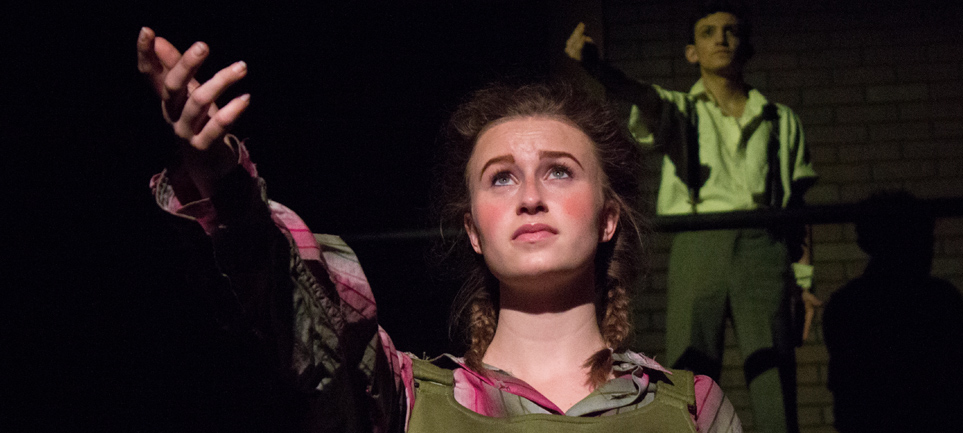
By Laurissa Senecal
“Urinetown,” Virginia Wesleyan College’s latest musical production, posed questions about ecological conservation while engaging the audience with catchy tunes, clever choreography and witty humor. Virginia Wesleyan works hard to reduce its carbon footprint by recycling and reducing waste. As such, the musical’s message of thoughtful environmental stewardship was fitting for the Wesleyan audience.
“It’s ironic what with the Greer Environmental Science Center being recently announced that the message of this play is taking care of the environment,” Assistant Director of the musical Trey DelPo said.
Ironic indeed, considering Dr. Travis Malone, head director of the play and Virginia Wesleyan’s associate professor of theater, selected Urinetown prior to the announcement of the Greer Environmental Science Center.
Set in a bleak dystopian future, the play opens with the narrator, played by Nicholas Hipple, explaining that due to water shortages, everyone in Urinetown has to pay to pee in order to fund “water conservation efforts.” The actors are ragged and dirty, shuffling around the stage as they bend over in pain, holding their bladders in dismay.
A corrupt business bureaucracy, run by the villain Cladwell B. Cladwell, played by Jamell T. Showell, holds the people in bondage, collecting their money allegedly for “water conservation research” while really using it to fund his opulent lifestyle. The hero Bobby Strong, played by Ryan Breen, leads an uprising against this corporation, jeopardizing his relationship with Cladwell’s daughter, Hope Cladwell, played by Sarah Puchalla.
The plot is a complicated tumble of star-crossed lovers, bursting bladders and unanswered questions. While it seems through much of the plot line that Cladwell is evil and everything will be righted if he is destroyed, the play’s conclusion suggests a different point.
After the death of both Cladwell and Bobby Strong, Hope Cladwell takes control of the city, “freeing pee” and destroying her father’s corrupt business. However, soon after Hope takes control, the water supply disappears, the people are starving and no one is happy. Little Sally, played by Abigail Horgan, exclaims, “This is a terrible musical! No one will want to watch this!”
“Urinetown” is a complicated musical. On the one hand, it is serious. It calls for people to care about the environment and demonstrates the disastrous results of not caring. However, on the other hand, it is laden with what Malone describes as “Potty Politics.” It treats death lightly, exaggerates the human condition and as it says in the “Dramaturg’s Note” on the bulletin, makes fun of “Broadway hits like Les Miserables and Fiddler on the Roof.”
The double-purposed nature of the play reflects the equally-doubled nature of politics and ecological conservation.
“These matters are complicated, to sell it as anything else is wrong,” Malone said.
The play meets the audience where they are. People are concerned with the coming election, worried about climate change and wondering what choices are the best to make. This play sympathizes with these concerns. “We are all faced with equally horrible choices but those are choices we have to make.”
While the satiric nature of the play does maintain a subtle undercurrent of scatological humor, the play does not stoop to vulgar jesting. It takes an honest look at two sides of an issue and says, “Maybe there is a middle way.” The students playing the different roles did a solid job. Malone teaches his students to take ownership of their roles.
“I am no longer Ryan Breen. I am Bobby Strong. It doesn’t matter what I want and need. It matters what my character wants and needs,” Breen said.
This teaching method was reflected in the quality of the production.
Even at the dress rehearsal, the actors stayed consistent in character, sang out in clear harmonies and passionately declared their lines. The live band played well, offering authentic support to the actors and adding to the ambiance. Audiovisual staff complimented the actors well with their adept use of spotlights. It was a chaotic performance, but it worked. There was constant running around, creative use of the limited stage space, diverse characters and funny gesticulations. For many like Breen, it was a last hurrah before graduation. For students who missed the performance, they can watch Breen’s capstone performance for his theater major on April 29.
“Urinetown” asked students to think about what they want and how they will get what they want. These matters are not simple. While “Urinetown” definitely purports a message of ecological conservation, it does not offer a simple answer. Similarly, it makes fun of musicals but still relies on the musical style to exist. Despite the ambiguity, it does at least make one definite plea.
“We all need to be more aware of how we are taking care of the planet,” DelPo said.


